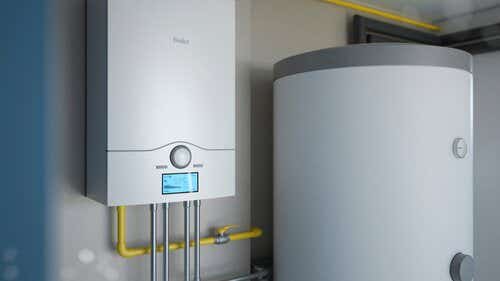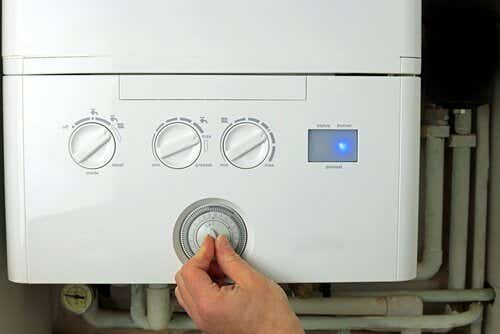Key takeaways
- The average cost of a new boiler is about £1,500
- Choose based on your household’s needs and budget
- Consider energy efficiency
- Remember to factor in the cost of installation.
If your boiler is 10-15 years old, frequently has issues or breaks down a lot, it may be time to get a new one.
Modern boilers are more energy-efficient than older ones, but the costs can vary. Read on to discover what a new boiler will cost you, the factors that affect cost and other things you may need to budget for.
What is the average cost of a new boiler in 2024?
The average cost of a boiler (as of October 2024) is around £1,500, according to Checkatrade. This excludes any installation or VAT charges. Installation can vary depending on the complexity of the job and where you live – generally it costs from £1,000 to £2,000.
Boiler prices can differ based on the make and model and the type of fuel the boiler uses. For example, boilers that use oil can be more expensive than electric ones due to higher installation costs. Either way, it’s always helpful to know how much money to put aside.
What factors affect the cost of a new boiler?
From the boiler type to its size and capacity, here are the four factors that affect the cost of a new boiler:
1. Boiler type
You can get many types of boilers in the UK, but most are condensing boilers which use mains gas.
There are different types of condensing boilers, including:
- Combi boilers, which have a smaller capacity
- System boilers with a cylinder, which would work for larger homes
- Heat-only boilers, also known as conventional boilers, with a cylinder and water tank that would work for larger homes.
There are also oil boilers and biomass boilers. Oil boilers typically use kerosene that’s delivered to your home. Biomass boilers run on biomass fuel such as wood pellets, chips or logs.
All these boilers heat up your home in different ways – some cost more, while others cost less.
2. Boiler size and output (in kW)
When we talk about boiler size, we don’t mean its height or width, but the power it generates in kilowatts (kW). The larger the boiler is in kWs, the bigger it is in size, which means it will probably have a higher price.
If you’re not sure which size and capacity boiler to get, consider the size of your property. The number of rooms, baths and showers, and the amount of heating you use will determine the boiler you need.
Too small a boiler and your house won’t be heated properly, and you won’t have enough hot water for baths and showers. Too big a boiler, and you’ll end up wasting energy and, subsequently, money. You need to find a boiler that’s right for your needs both now and in the future.
3. Boiler brands and models
With boilers, the more premium you go, the more you’ll have to pay. However, rather than only considering price, it’s worth considering reliability and the benefits of having a boiler that meets demand.
In the UK, your new boiler is likely to be one of the following brands: Worcester Bosch, Vaillant, Alpha, Viessmann or Ideal. These are some of the most efficient boilers you can get.
Boiler prices will vary across different brands and models, but you’ll want one with a high efficiency rating. So, what rating do you look out for?
There are two main ways boiler efficiency is rated:
- ErP rating. The Energy-related Product (ErP) Directive 2009 means that all gas boilers have to be rated A-G for energy efficiency. Since 2015, all new gas boilers in the UK have to be rated ‘A’ by law. This is the most efficient (minimum 92% ErP efficiency).
- SEDBUK score and rating. The Seasonal Efficiency of a Domestic Boiler in the UK (SEDBUK) system was replaced by ErP ratings but still applies to older boilers made before 2015. The 2009 SEDBUK gave each boiler a percentage score. The previous SEDBUK 2005 system gave boilers a percentage score and a rating from A-G.
4. Boiler installation costs
The cost of a new boiler isn’t limited to the price of the boiler alone, but also includes installation.
If boiler installation requires changes to be made to your plumbing or current heating system, you may have to pay more for labour. And if you choose to add extra components like thermostats or smart controls, this will increase the price too.
New boiler costs by type
How much does a combi boiler cost?
The average cost of a combi boiler is £1,500.
A combi boiler has all the components needed to heat and distribute your water, so all your hot water and heating is supplied from the same unit.
Combi boilers tend to be best for smaller properties with a small bathroom.
How much does a system boiler cost?
The average cost of a system boiler is £1,500.
A system boiler works by heating water from the mains to provide hot water and central heating to your home.
System boilers are best for larger households with multiple bathrooms and radiators.
How much does a conventional boiler cost?
The average cost of a conventional boiler is £1,500.
A conventional boiler feeds water directly to the central heating system or stores it within a hot water cylinder to provide hot water when needed. It’s also known as a heat-only boiler.
Conventional boilers are best for larger properties as they distribute hot water to multiple outlets simultaneously. They are also good for older properties.
How much does an electric boiler cost?
The average cost of an electric boiler is £1,500-£2,000.
If you want to improve your carbon footprint, you might think about opting for an electric boiler. This heats water by passing an electric current through a heating element instead of burning gas.
Electric boilers tend to be best for smaller properties.
How much does an LPG boiler cost?
The average cost of an LPG boiler is £1,500.
An LPG boiler (Liquid Petroleum Gas) uses propane and butane, two colourless liquids that help heat homes.
LPG boilers are best for those living in rural locations where there’s no connection to the mains gas grid.
How much does a biomass boiler cost?
The average cost of a biomass boiler is £5,000-£10,000.
Also known as a wood boiler, this relies on wood pellets, chips or logs to generate heat.
Biomass boilers are best for those with larger properties as they take up a lot of space.
How much do boilers cost to install?
The average rate for boiler installation is around £300 per day. This price is based on a few factors including:
- The type of existing boiler system
- Whether you’re changing fuel types
- Make and model of the new boiler
- The complexity of the installation
- Any new pipework that’s needed
- If the boiler needs to be moved
- Where you live (London will be more expensive, for example).
And don’t forget about timeframes. A like-for-like boiler installation can take between four and six hours while converting from a regular boiler to a combi boiler can take between up to two days.
What other costs are there?
You may be charged for additional required equipment, such as new or replacement pumps or valves along with the control system if switching from one type of boiler to another. Other optional extras may include fitting wireless smart control systems (around £200), as well as boiler magnetic filters and a chemical cleanse of your existing pipes to improve the efficiency of your system (anything from £300 to £500).
If the job requires it, you’ll also be charged for the cost of moving your boiler – this would include laying new pipes and may involve some building work.
All of these additional costs should be itemised and included in the quote.
Are there any government grants or schemes to make buying a new boiler cheaper?
Yes, there are government grants and schemes to help you out when buying a new boiler.
The government’s Boiler Upgrade Scheme covers some of the cost of replacing a fossil-fuelled system with a heat pump or a biomass boiler.
To be eligible, you must:
- Own the property
- Have installed your new heating system on or after 1 April 2022
- Be replacing a fossil-fuelled heating system with a maximum capacity of less than 45 kWh.
There’s also the Energy Company Obligation (ECO), a government energy efficiency scheme designed to tackle fuel poverty and reduce carbon emissions. This could provide you with financial support to replace an old and inefficient boiler or heating system.
You could be eligible for the ECO scheme if you receive one of the following (the exact criteria will depend on your energy supplier):
- Child Benefit
- Pension Guarantee Credit
- Income-related Employment and Support Allowance (ESA)
- Income-based Jobseeker's Allowance (JSA)
- Income Support
- Tax Credits (Child Tax Credits and Working Tax Credits)
- Universal Credit
- Housing benefit
- Pension credit saving credit.
How long does it take to recoup the cost of a new boiler in savings?
While cost isn’t the only factor in purchasing a new boiler, you’ll want to know how long it’ll take for the boiler to pay for itself in savings on your gas bill.
Replacing an old inefficient boiler with a new one means you can expect to save some money — how much depends on your old boiler. Check your current boiler’s rating – older boilers can have lower than 50% efficiency, while the newest condensing boilers should exceed 90% efficiency. That difference is startling – with an old G-rated boiler, you could effectively be wasting 40% of the money you spend on them. That means for every £1,000 you spend on gas, up to £400 could be essentially thrown out of the window. And as energy costs spiral, so too does the amount you’re wasting – upgrading now could easily recoup £600-800 over the next 12 months alone.
According to the Energy Saving Trust, here's what you can expect from a new condensing boiler with an A rating, room thermostat and thermostatic radiator controls:
| Old boiler rating | Annual savings for a detached bungalow | Annual savings for a detached house | Annual savings for a mid-floor flat | Annual savings for a semi-detached house | Annual savings for a mid-terrace house |
|---|---|---|---|---|---|
| G | £290 | £490 | £120 | £320 | £270 |
| F | £210 | £340 | £85 | £220 | £190 |
| E | £180 | £270 | £75 | £200 | £170 |
| D | £160 | £220 | £65 | £180 | £150 |
Figures are based on fuel prices as of October 2024.
How long it takes your boiler to recoup its cost will depend on its cost divided by the annual savings it delivers. So, for example, if you pay £3,000 for a new boiler, and it reduces your bills by £400 a year, then it will have paid for itself after 7.5 years.
What to do before you buy a new boiler
Before you rush out to buy a new boiler there are plenty of other steps you can take to cut your heating costs without splashing out.
A new boiler is a big investment, so it can take a while to make your money back in savings. Here are a few cheaper measures that you could take to cut your heating bill:
Have your boiler serviced. A service will make sure that it's running properly and can eliminate lots of problems. Read our boiler maintenance tips for some simple measures you can take yourself to help your boiler run better.
Get new heating controls - a new thermostat, thermostats (thermostat radiator valves or TRVs) on your radiators, a new timer, and new radiators could all help.



